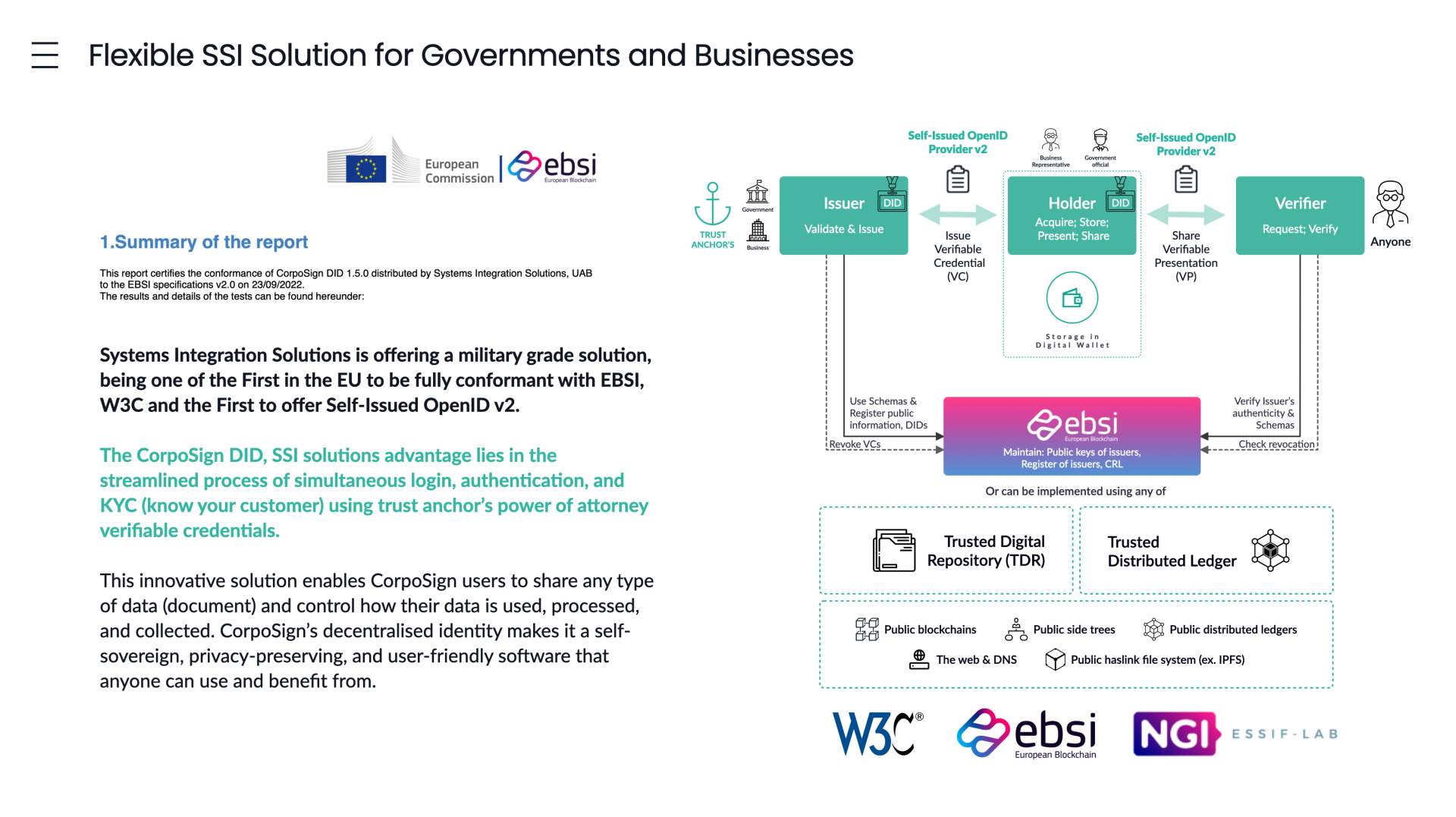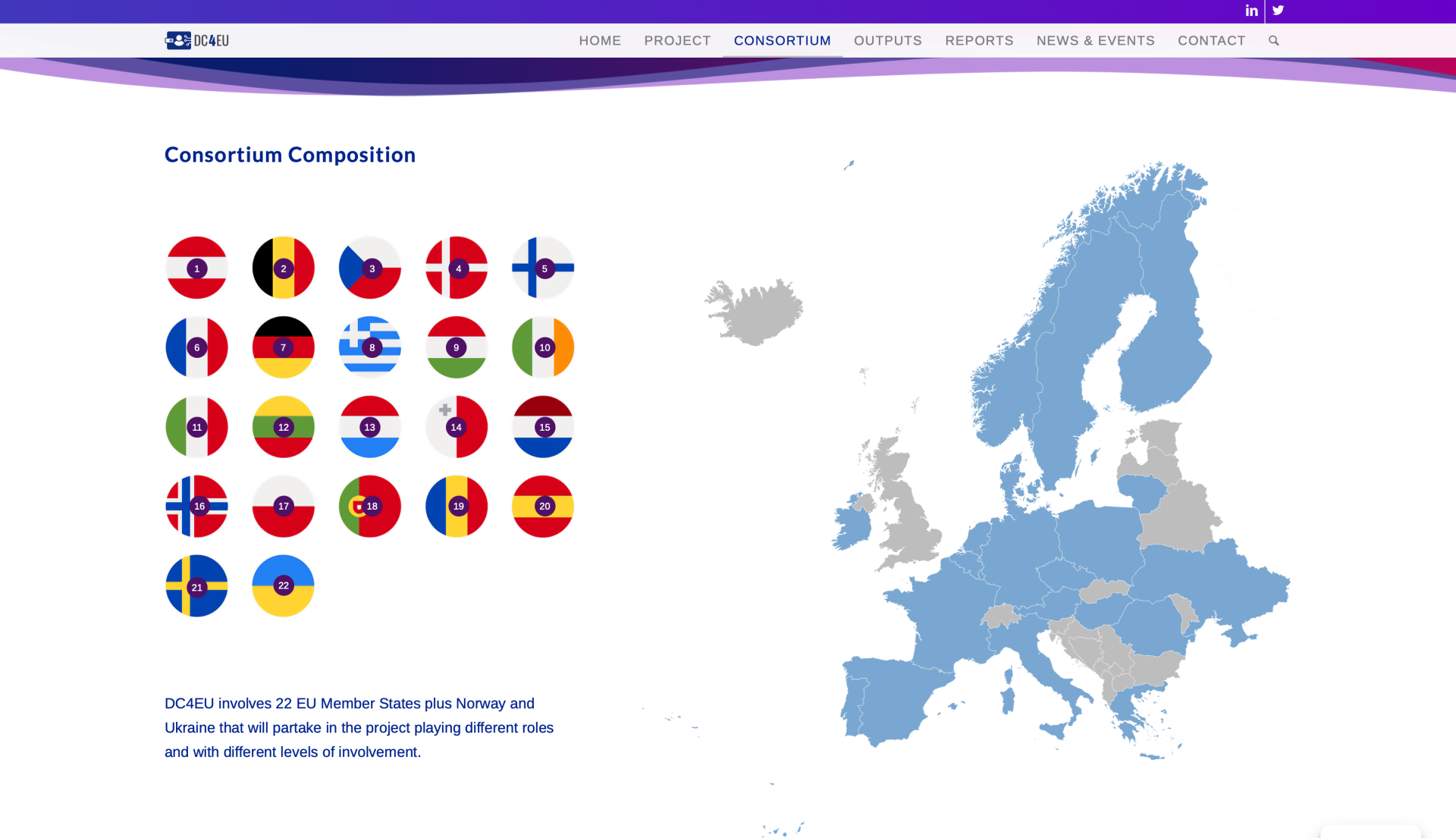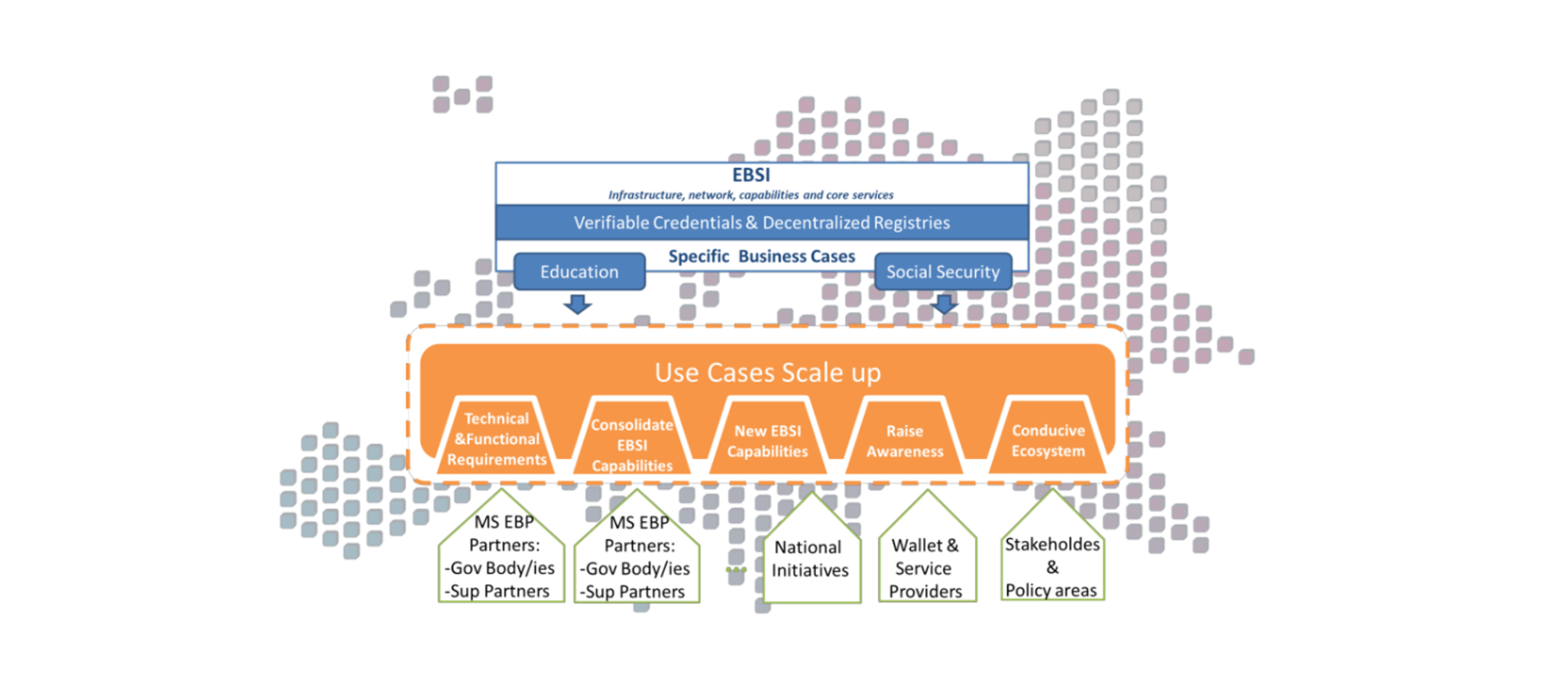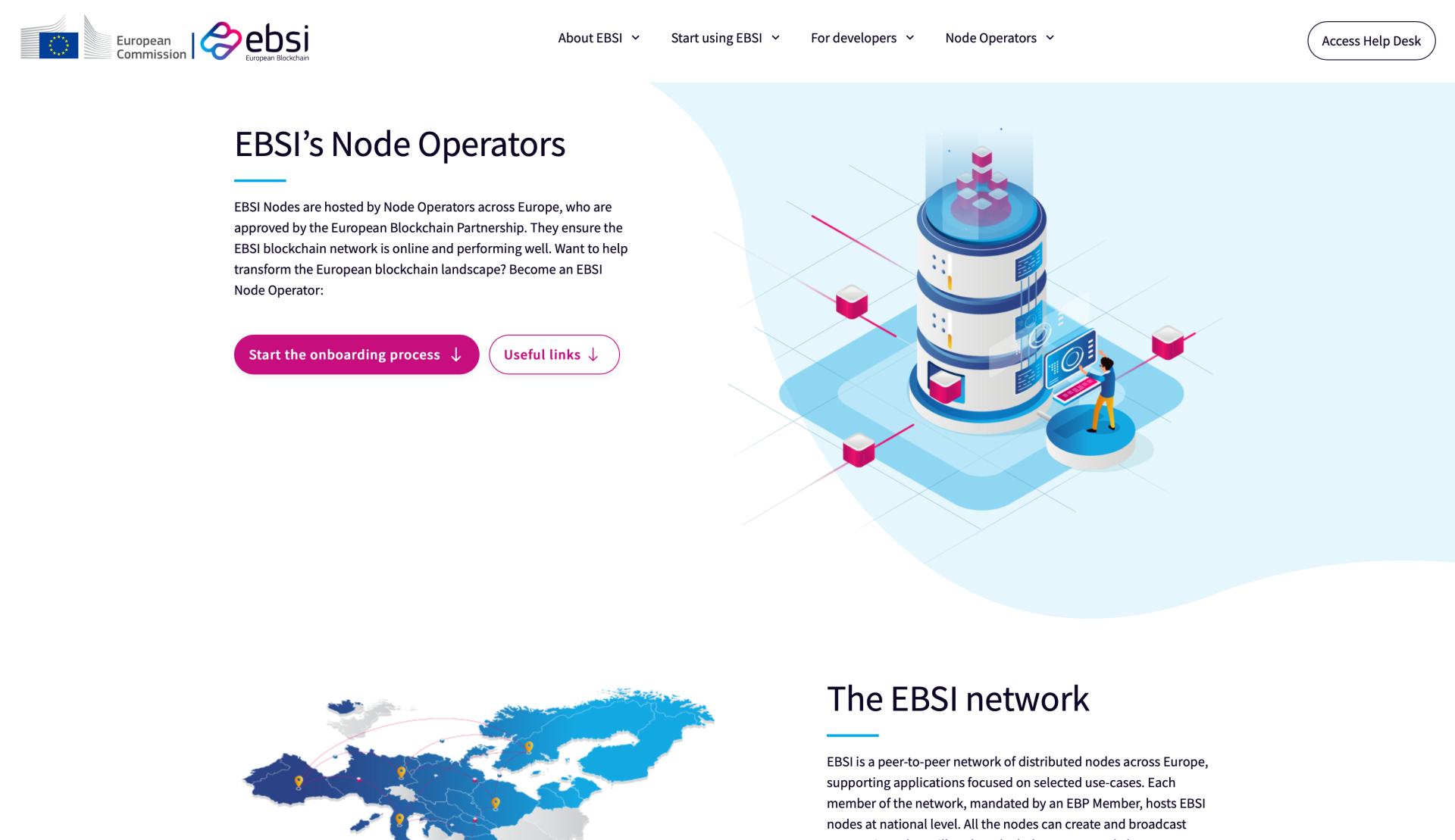Unleashing Europe’s Digital Future: Systems Integration Solutions (SIS) Selected for Key European Projects
The digital era has ushered in a new chapter for Europe. Systems Integration Solutions (SIS), IT company based in Lithuania, invites interested parties to join us on a transformative journey towards digitization. We are proud to announce our involvement in three pivotal European projects – Digital Credentials for Europe (DC4EU), European Blockchain Service Infrastructure Network Expansion (EBSI-NE), and EBSI Enabled Verifiable Credentials & Trusted Organizations Registries (EBSI-VECTOR). These initiatives aim to catalyze Europe’s digital transformation, enhancing cybersecurity, fostering trusted cross-border data exchanges, and promoting privacy with blockchain technology.
We extend our invitation to:
- Educational Institutions: can greatly contribute by participating in the pilot and creating new use cases, requirements, and solutions that improve cybersecurity and educate on the intricacies of blockchain, identity, verifiable credential solutions, and SSI data exchange.
- Business partners: particularly those interested in authentication, secure cross-border data exchanges, QR code KYC onboarding, KYB onboarding, secure QR code payment solutions, Request to Pay solutions, or simply those who prioritize privacy and cybersecurity – you are welcome to join this ambitious project.
- Financial institutions and banks: who eager to enhance cybersecurity and the privacy of personal and business identities, have a unique opportunity. If you are looking to explore QR code KYC onboarding, KYB onboarding, secure QR code payment solutions, and Request to Pay options while placing privacy and cybersecurity at the forefront, then this initiative is for you. Discover advanced identification methods that don’t require disclosing sensitive data and facilitate seamless authentication across various systems or platforms.
- Developers and infrastructure experts: interested in co-creating the future of trusted digital data exchanges – your technical expertise and innovative thinking are needed to shape the EU’s digital landscape.
Understanding the Why: EBSI and European Projects
At the heart of these initiatives lies the vision of a unified and secure digital Europe, where data exchange is both seamless and trustworthy. As cyber threats continue to rise, enhancing cybersecurity through these projects is vital to protect the integrity and privacy of data.
The European Blockchain Services Infrastructure (EBSI) is a joint initiative by the European Commission and the European Blockchain Partnership (EBP) aiming to deliver cross-border digital public services across the EU using blockchain technology. These projects are part of a broader strategy to enhance data exchange trust, improve cybersecurity, and foster a single digital market. Through EBSI, a network of nodes (computers) securely exchanges data, fostering trust by ensuring the data’s integrity, provenance, and immutability. It provides a foundational layer for producing and verifying digital credentials, boosting the efficiency of public services, and facilitating secure and private data transactions across EU borders.
Moreover, by harmonizing digital standards across borders, these projects will lay the foundation for a single digital market, enabling businesses to expand their reach and consumers to access a broader range of digital services.
Potential Use Cases of Digital Data Exchange and Verifiable Credentials
The transformative potential of these projects can be best understood through the use cases they enable. For instance, digital data exchange can enhance transparency and efficiency in government services, reducing bureaucratic red tape. It could facilitate seamless recognition of educational qualifications across borders, making it easier for professionals to work in different EU member states.
Verifiable credentials (VC) represent a digital version of physical credentials such as passports, driving licenses, qualifications, and more. They empower individuals and organizations to securely and privately assert verifiable claims. These could be used to digitally verify an individual’s qualifications, identity, or even health records. They could replace traditional paper-based processes, reducing fraud and making identity verification more efficient and secure.With SIS’s admission into these pivotal projects, a multitude of potential use cases come into focus. Verifiable credentials, for instance, can transform educational and professional qualifications. Students across the EU could seamlessly transfer their educational credits, and professionals could authenticate their qualifications without bureaucratic delays, making mobility and employment across the EU easier and more efficient.

The Crucial Role of SIS in European Projects
In DC4EU (https://www.dc4eu.eu), SIS has been admitted into Work Package 5 (WP5), which focuses on educational credentials and professional qualifications. The consortium involved in WP5 will be dealing with the critical task of designing and implementing activities for educational credentials and professional qualifications. One key area they will tackle is the adaptation of onboarding proceedings specifically for the educational sector. Furthermore, they aim to enable a hybrid scenario that leverages the potential of the EUDIW for existing cross-border initiatives. The consortium will also work on identifying synergies and opportunities with other ongoing cross-border initiatives. At this juncture, SIS will bring valuable insights from its CorpoSign DID expertise, particularly in coordinating educational related activities and ensuring a comprehensive evaluation of piloting processes.

In EBSI-VECTOR (https://ec.europa.eu/digital-building-blocks/wikis/display/EBSI/Home), SIS is part of Work Package 4 (WP4). WP4 consortium is focused on enhancing the existing EBSI Diploma use case by identifying new business requirements necessary to support the educational domain. One major objective is to broaden the scope of education specifications so that EBSI can readily support vital educational business functions, including the revocation and suspension of mandates. A key part of this work will involve defining and developing cross-border journeys for the identified educational capacities, with a special focus on the four dimensions of interoperability (organizational, legal, technical, and semantic). In this package, SIS, with its understanding of Lithuanian educational sector needs, will significantly contribute to the testing and implementation of these capabilities in Lithuania.

In EBSI-NE (https://ec.europa.eu/digital-building-blocks/wikis/display/EBSI/Node+Operators), SIS is a part of Work Package 2 (WP2), aiming to ensure the deployment of secure and reliable EBSI nodes in the production environment. In WP2, the consortium’s attention will be on the deployment of EBSI nodes in the production environment. The consortium will prepare the infrastructure according to the EBSI Node Operator policy requirements, ensuring network reliability and security. Key activities will involve the deployment and configuration of the EBSI node software package, as well as performing tests and adjusting configurations as needed. SIS, with its prior experience in setting up nodes, will be instrumental in achieving these objectives efficiently.

Achieving a single digital market demands a concerted effort from governments, businesses, and educational institutions. Their inputs are crucial in designing user-friendly use cases and building an inclusive digital infrastructure. Through their involvement, these stakeholders can ensure that the benefits of these projects extend to every citizen, creating a digital market that is not only secure but also user-centric.
Through these initiatives, SIS is not just shaping the digital future of Europe; it is also building a model for the world to follow. It demonstrates how innovation, when coupled with a vision of inclusivity and security, can create a digital ecosystem that benefits all. As we move forward into the digital age, initiatives like these will play a pivotal role in defining how societies function, interact, and grow.
Aiming for a Unified Digital Europe
These projects and SIS’s role in them collectively aim to create a unified digital Europe where data exchange is trustworthy, secure, and efficient. The goal is to enhance the educational credentials, professional qualifications, and diplomas at a cross-border level, offering EU citizens a seamless digital experience.
As SIS forges ahead in these projects, it stays committed to its goal of shaping the digital future of Europe, providing innovative solutions that meet the needs of a diverse and evolving digital landscape. Through these projects, SIS seeks to contribute to the overall objective of the European Union’s digital single market strategy, which is to ensure that Europe’s citizens and businesses can seamlessly access and exercise online activities under conditions of fair competition, and a high level of consumer and personal data protection, irrespective of their nationality or place of residence.
Future Services within CorpoSign
The expertise, knowledge, and insights gained from these projects will later be offered within the CorpoSign platform as single or separate services for interested organizations.
To get a glimpse of the CorpoSign DID in action, watch this demo video: https://youtu.be/fIo_Gdz80K8
Contact us so we can co-create the future: [email protected], [email protected], [email protected]
Join the learning journey!
Stay updated on digital transformation trends, gain valuable insights, and receive exclusive access to tools and resources that drive your business forward.
Success! Welcome to our community.
You've taken the first step towards gaining valuable insights into the world of digital transformation. Look forward to our emails enriching your inbox and your understanding of the digital landscape. Happy learning!
Invaluable insights and industry trends, right in your mailbox.